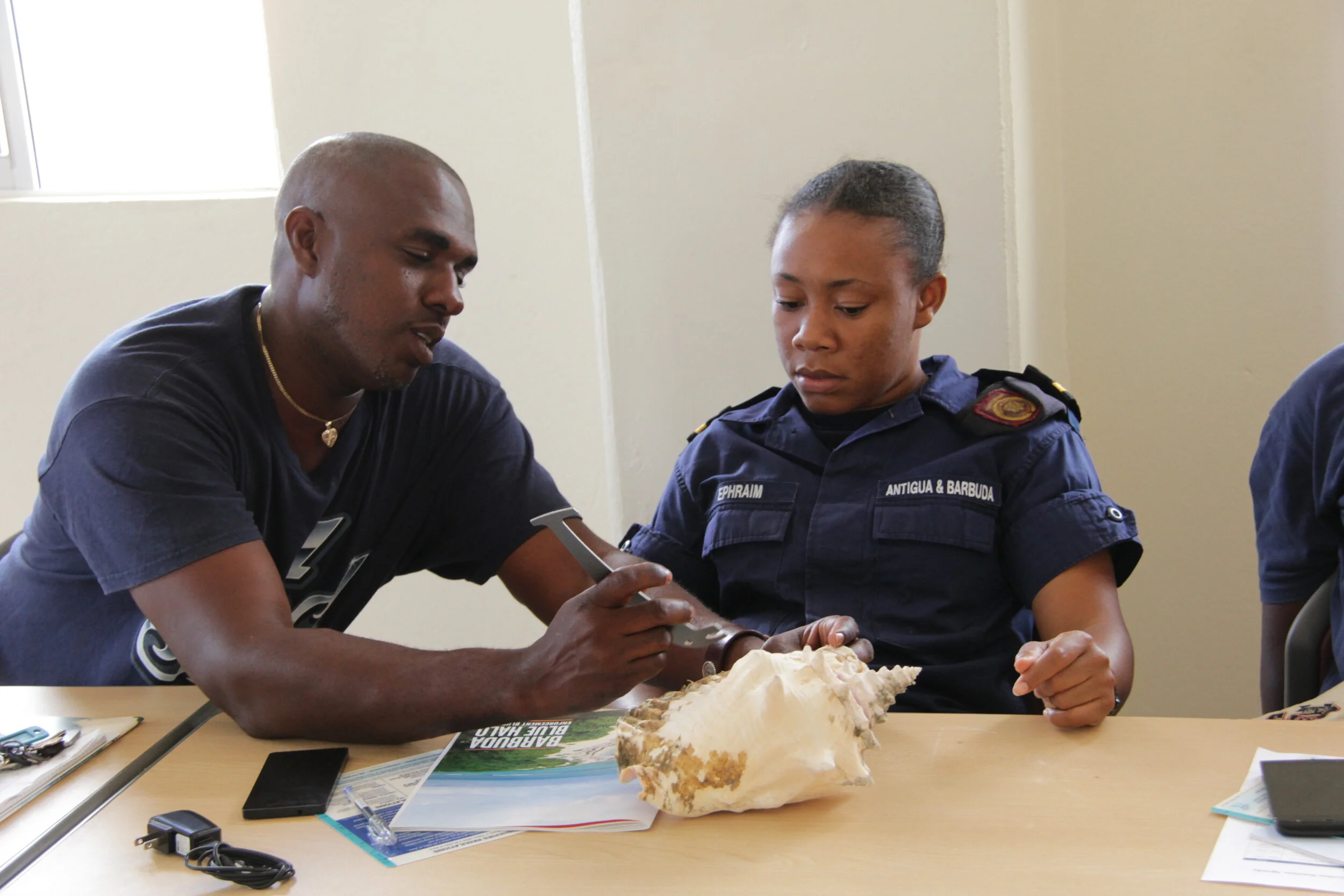From Laws on Paper to Enforcement on the Water: Sustainable Ocean Management Gets Real in Barbuda
Originally published on the (now archived) National Geographic blog.
Co-authored with Andy Estep, Science Manager of the Waitt Institute
April 28, 2015
For the first time in the history of Barbuda, law enforcement agents from four agencies gathered in the Codrington Fisheries Complex to collaborate on the enforcement of ocean laws in the island’s waters. This important step will ensure that the community reaps the benefits of new local regulations passed for coastal zoning and fisheries in August 2014.
Graduation day for the marine enforcement workshop class. (Photo: Chad Koll)
The three-day enforcement workshop was an enormous step forward in transforming abstract words and zoning maps into a sustainably managed fishery and coral reef. Soon, those new regulations will be implemented – already, fishing permits are being issued and patrols are being planned.
“This workshop definitely enhances the whole idea of the Blue Halo Initiative because it actually brings the participants up to speed about how we are going to enforce the fisheries regulations,” said David Shaw, chairman of the Barbuda Council. “This is the way that we will conserve and preserve our environment for the betterment of a sustainable economy for both Antigua and Barbuda.”
In the room, the excitement could be felt as representatives of the coast guard, police, fisheries, and national park learned how to best work together to protect the reefs, and defend the future of Barbuda from overfishing.
Barbuda agencies join forces to learn techniques for enforcing new coastal zones and regulations. (Photo: Andy Estep, Waitt Institute)
Participants practice measuring for legal conch size using a gage provided by the Waitt Institute. (Photo: Andy Estep, Waitt Institute)
Barbudans are even more committed now to protecting and restoring their marine resources. The most challenging part was simply getting started.
The free workshop was sponsored by the Waitt Institute and led by WildAid, a non-profit organization with expertise in marine law enforcement. Participants learned how to plan patrols, conduct surveillance, collect evidence, and process their findings.
“When the Barbuda Council banned fishing in the lagoon [in the 1990s], in less than 18 months there was such an abundance of lobsters,” said local lobster fisher and exporter Lincoln Burton. “And it’s just because of a regulation. It was great.”
Staff from WildAid discuses the map of new coastal zones with workshop participants. (Photo: Andy Estep, Waitt Institute)
“Enforcement is a critical part of any fishery because without enforcement, anyone does what they want to do, how they want to do it, and it may not be the best practice,” said Kelly Burton, manager of Codrington Lagoon National Park. “We have to ensure that we know what is taken, where it’s taken from, and how much of it is taken. With that everyone can catch more and make more money and we can have a sustainable fishery.”
During the workshop, participants developed practical and conceptual skills that will enable them to successfully enforce the new laws and defend the reefs from overfishing. The critical importance of communication and collaboration became the central theme.
“We must move forward with our strategy,” said Inspector Thomas, a 30-year veteran of the Barbuda Police. “We must build a foundation of community engagement and voluntary compliance rooted in mutual respect.”
“We all have our part to play in this venture, so we need to be united as one for it to work,” said Doug Beazer, Barbuda’s Senior Fisheries Officer. “I am not saying that things will happen overnight, but working together means we will stand a good chance.”
Participants surveying Codrington Lagoon during equipment training sessions. (Photo: Andy Estep, Waitt Institute)





